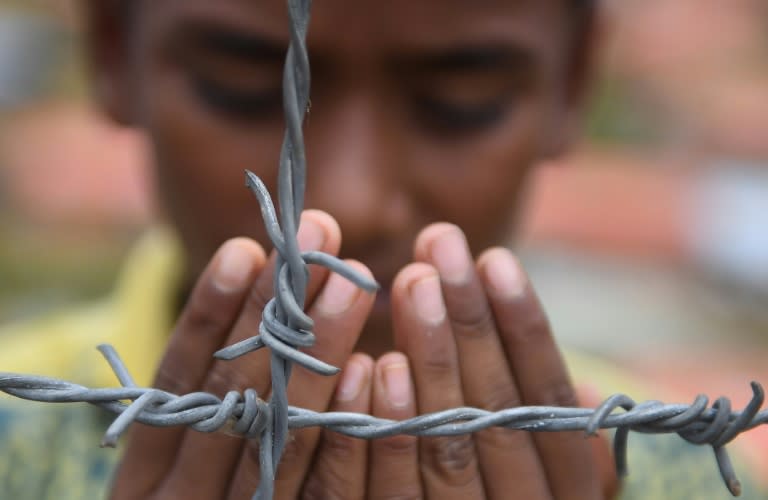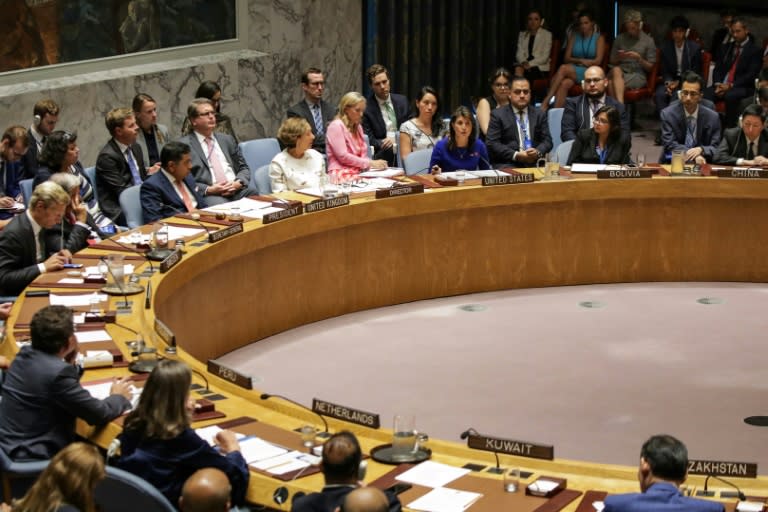Myanmar rejects UN probe findings of Rohingya 'genocide'
Myanmar Wednesday rejected the findings of a UN investigation alleging genocide by its military against the Rohingya, after the US and other countries joined growing calls for them to face justice. Mainly Buddhist Myanmar has come under immense pressure this week over last year's military crackdown that pushed more than 700,000 of the Muslim minority into Bangladesh. On Monday the UN probe detailed evidence of genocide and crimes against humanity "perpetrated on a massive scale" against the Rohingya, including acts of rape, sexual violence and mass killings. In a UN Security Council session a day later, several countries -- including the US, Britain, France and Sweden -- called for Myanmar's military leaders to be held accountable. The meeting was one of the most high-profile to date to address the crisis and featured graphic testimony from actress Cate Blanchett, who visited the refugee camps in May as a goodwill ambassador. "I am a mother and I saw my own children in the eyes of every single refugee child that I met. I saw myself in every parent," she told the Security Council. "How can any mother endure seeing her child thrown into a fire? Their experiences will never leave me." Myanmar rejected the UN mission's findings in a typically defiant response to a crisis that has heaped international opprobrium on both its military and civilian leadership. "We didn't allow the FFM (the UN Fact-Finding Mission) to enter into Myanmar, that's why we don't agree and accept any resolutions made by the Human Rights Council," said government spokesman Zaw Htay, according to Wednesday's state-run Global New Light of Myanmar newspaper. He pointed to the formation of Myanmar's own Independent Commission of Enquiry, which he said was set up to respond to "false allegations made by the UN agencies and other international communities". The country has "zero tolerance for human rights violations," Zaw Htay said, but he added that "strong evidence" including records and dates of any alleged abuses must be provided before investigations are undertaken. The government would take "legal action against any violation of human rights," he said. - Facebook ban - Zaw Htay also lashed out at Facebook for shutting down the pages of Myanmar's army chief and other top military brass on Monday, saying the move could hamper the government's efforts at "national reconciliation". The social media giant has admitted it was previously too slow to react to the crisis, which saw its platform -- wildly popular in Myanmar -- become an incubator of hate speech against the Rohingya. Much of Myanmar's public has vilified the Rohingya since the army's crackdown, with little sympathy for a minority who have for years been refused citizenship and denied freedom of movement and access to healthcare and education. Myanmar's military retains significant constitutional and political power and is essentially free of civilian oversight. But the country's civilian leaders, including Nobel laureate and de facto head of state Aung San Suu Kyi, have repeatedly defended the military crackdown as a proportionate response to Rohingya insurgents in Rakhine state who staged deadly raids on police posts on August 25, 2017. However the UN report agreed with rights groups who say the crackdown was premeditated, a key factor in determining if a genocide has taken place. It pointed to the large-scale military deployments to Rakhine in the weeks leading up to the campaign in a "broader oppressive context". Around a million Rohingya now languish in refugee camps in Bangladesh, which has struggled to deal with the huge influx into an already impoverished country. Bangladesh and Myanmar have signed a deal to repatriate last year's wave of refugees but there has been little progress given Rohingya fears of returning without guarantees for their safety. Meanwhile the drumbeat of calls for accountability is getting louder, with UN investigators calling on the Security Council to refer the Myanmar crisis to the International Criminal Court (ICC) or to create an ad hoc tribunal. Several Security Council members threw support behind the idea while also calling for a mechanism to "collect and preserve proof" of abuses. Myanmar's ambassador to the UN Hau Do Suan questioned the UN report's findings, reiterating that Myanmar "did not accept the mandate of the mission because we have our concern about the mission's impartiality." China and Russia, holding veto powers as permanent members of the Security Council, have said they prefer to engage in "dialogue" with Myanmar's leadership to resolve the conflict. The ICC is soon due to rule on whether it has jurisdiction over the crisis because it spilt across the border into Bangladesh. Myanmar is not a signatory to the court.



